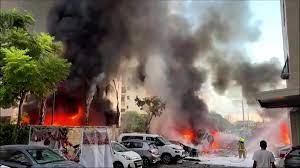In a recent escalation in the Israel-Palestine conflict, On Saturday, October 7th, 2023, Hamas militants launched a surprise attack from the Gaza Strip, firing thousands of rockets and sending dozens of fighters into Israeli towns near the border. Israel responded by launching airstrikes in Gaza and mobilising ground forces for a possible invasion. The attack was seen as unprecedented in its scale, timing, and sophistication, catching Israel on a major Jewish holiday, and bringing about one of the most serious escalations in the Israel-Palestine conflict in recent years.
View this post on Instagram
Looking back at the circumstances leading to the ongoing situation, the Palestinian News & Information Agency (WAFA) reported earlier this week.
“Israeli forces shoot two Palestinians near Tulkarm”
“Abu Rudeineh says Israeli settlers’ incursions to Jerusalem won’t give legitimacy to occupation”
“PM Shatyyeh warns against dangerous repercussions of ongoing crimes of Israeli occupation and its settlers”
“Israeli settler plows plot of land in Northern Jordan Valley, a prelude for takeover”
“Dozens of students suffocate during Israeli military incursion into Hebron-area town”
Following the attack on Saturday, Israel has since declared war against its neighbour in retaliation.
Associated Isreal Press (AIP), a private and independent news agency that is affiliated with the Associated Press (AP) reported;
“Israel strikes back at Hamas after a surprise attack from Gaza”
“Netanyahu vows to restore calm and security after Hamas ‘act of war'”
“Israelis in shock and fear after Hamas’ unprecedented assault”
“How Hamas managed to launch its biggest attack ever on Israel”
“Israel faces international criticism for its response to Gaza rockets”
The history of the Israel-Palestine conflict is a complex and long-standing one, involving political, religious, and historical factors. The origins of the conflict can be traced back to the late 19th century, when Zionism, a movement that sought to establish a homeland for the Jewish people in Ottoman-controlled Palestine, emerged in response to the persecution and antisemitism faced by Jews in Europe and elsewhere.
In 1917, during World War I, the British government issued the Balfour Declaration, which endorsed the idea of a Jewish homeland in Palestine, while also respecting the rights of the existing non-Jewish communities. This declaration encouraged more Jewish immigration to Palestine, which was met with resistance and hostility by the Arab population, who also had national aspirations.
After World War II and the Holocaust, which killed about six million Jews in Europe, international pressure mounted for the creation of a Jewish state in Palestine. In 1947, the United Nations proposed a partition plan that would divide Palestine into two states: one Jewish and one Arab, with Jerusalem as an international city. The plan was accepted by the Jewish leadership, but rejected by the Arab leaders, who saw it as unfair and unjust.
In 1948, following the end of the British mandate in Palestine, the Jewish leadership declared the establishment of the State of Israel. This triggered a war between Israel and its Arab neighbour.
In the significant development in the conflict this weekend, over 150 people have been reported killed, with 1,100 wounded in Israel as Hamas, the Palestinian militant group, launched its most significant attack in years. This attack involved dozens of gunmen from Gaza infiltrating southern Israeli communities under the cover of heavy rocket fire. They have taken Israeli soldiers and civilians hostage, with some transported back to Gaza.
In response, Israel initiated a wave of airstrikes on Gaza, resulting in the death of 232 people and injuries to 1,600, according to medics. Israeli Prime Minister Benjamin Netanyahu declared that Israel was “at war” and vowed that Hamas, which governs Gaza, would “pay an unprecedented price.”
BBC reports that Hamas fighters breached the perimeter fence at dawn, launching barrages of rockets from Gaza, some reaching as far as Tel Aviv and Jerusalem. How these gunmen managed to penetrate one of the world’s most heavily fortified borders remains unclear. The Israeli military conducted airstrikes on Hamas sites in Gaza, targeting 17 military compounds, and mobilized tens of thousands of reservists.
Notably, an 11-story tower in downtown Gaza City, housing Hamas radio stations on the rooftop, was destroyed by Israeli bombs. Medical aid group Medecins Sans Frontieres reported casualties among healthcare workers due to Israeli strikes on two hospitals in Gaza.
Reuters news agency reported that Israel’s energy minister, Israel Katz, stated that they would cut off Gaza’s electricity supply in response to the rocket barrages from Gaza – the most substantial attack by Hamas on Israel in years. These attacks occurred on the Jewish Sabbath and the festival of Simchat Torah.
According to the BBC, the Israel Defence Forces (IDF) reported that “terrorists” had infiltrated Israeli territory in multiple locations, trapping residents in their homes as militants entered their towns and villages. Videos from Sderot, near Gaza, showed heavily armed Palestinian militants engaged in firefights with Israeli forces.
Israel-Palestine conflict, Hamas claimed to have captured 53 “prisoners of war,” including senior Israeli army officers, some held in tunnels. The IDF confirmed the abduction of soldiers and civilians but denied reports of a top general’s kidnapping. The IDF engaged in combat with Hamas in 22 locations, with militants also entering Israel by sea near Zikim on the coast north of Gaza. Footage circulated of Palestinians driving Israeli military vehicles in Gaza.
Rocket barrages continued throughout the day, with thousands launched towards Israel, including central cities like Tel Aviv, Bat Yam, and Giv’atayim, causing lockdowns and empty streets. Prime Minister Netanyahu emphasized that Israel was at war, not merely an operation or escalation, and ordered the clearing of infiltrated communities while mobilizing reserves and responding with substantial force.
Israel-Palestine conflict, Hamas military commander Mohammed Deif declared the start of the attack, calling it the “greatest battle to end the last occupation on Earth” and urged Palestinians everywhere to join. Hamas leader-in-exile Ismail Haniyeh stated that Palestinian factions intended to expand violence to the West Bank and Jerusalem. Hamas spokesperson Ghazi Hamad claimed direct backing from Iran, with an adviser to Iran’s supreme leader affirming support for Palestinian fighters.
Palestinian President Mahmoud Abbas asserted the right of the Palestinian people to defend themselves against “settlers and occupation troops.” An investigation into Israeli intelligence’s failure to anticipate the coordinated Hamas attack is underway.
Internationally, there has been strong condemnation of the Hamas attacks, with the UK, NATO, the UN, the European Commission, and the US condemning the violence. Qatar’s foreign ministry placed responsibility on Israel for the escalating violence.
YOU MAY ALSO READ ON PRUDENCE JOURNAL
Peter Obi’s Impact on Nigeria’s 2023 Election: Paving the Way for Multi-Party Democracy
Nigeria’s Knowledge Drain: Exodus of Healthcare Professionals Hurting the Nation
REVIEW: Jagun Jagun – A Nigerian action drama showcasing the Yoruba culture









Got a Question?
Find us on Socials or Contact us and we’ll get back to you as soon as possible.